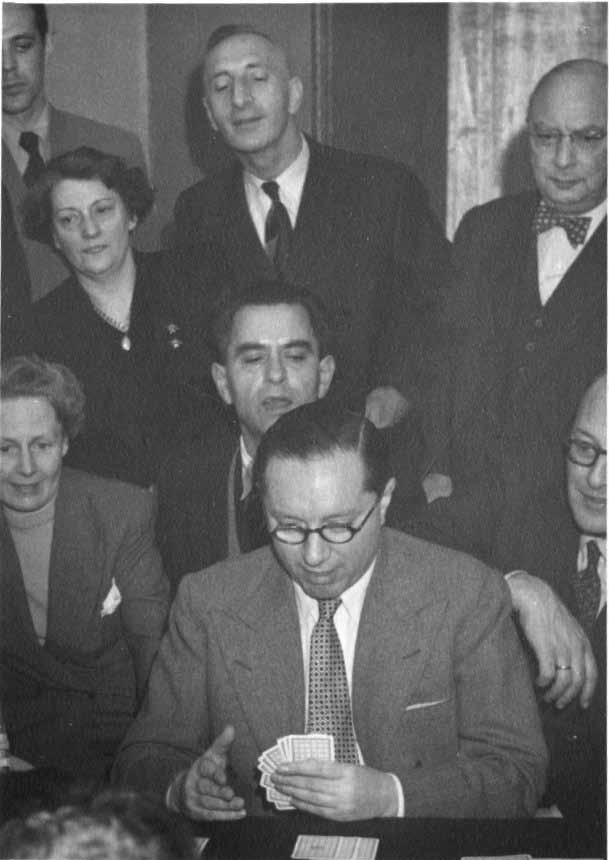Extracted from: Card Play Technique Or The Art of Being Lucky by Victor Mollo, N. Gardener
Switching
Returning partner’s suit is a commendable practice, because it usually pays. But it is not one of the seven deadly virtues, and no stigma attaches to the man who deviates. Like everything else, it calls for the exercise of judgment.
Test yours on this deal.
| |
|
| |
|
North raises South’s non-vulnerable No-Trump (12-14 points) to Three, and West leads a small Spade. What exactly do you do as East?

Clearly there can be no future or the defence in Spades. Neither is there any point in holding up the Ace. You should reason like this : » West can’t have much, but there is just room in his hand for a King—an Ace even. I hope so anyway, for if he has no high card at all, we are sunk. Now what shall I play back? A Heart is quite safe. It will give nothing away. But neither will it do any good. Our one chance is to collect three tricks in Diamonds. So, here she goes.» You play a small Diamond, allowing declarer to win the trick. But now the table’s holding is reduced to K x (or x x). If declarer is not in a position to rattle off nine tricks and has to let in West—with the King of Clubs maybe—the contract is broken.
The next example is a little more difficult:
| |
|
| |
|
West opens the deuce of Spades against Three No-Trumps and declarer plays dummy’s nine. This is the moment for reflection. Afterwards it will be too late. Obviously a sustained attack on the Spades will not defeat the contract. Should East duck, just to see what suit South goes for himself? Perish the thought. Spades and Diamonds look like yielding him six or seven tricks, and given TIME, he is certain to develop two or three more. That tempo is too precious to lose. So up with the Ace of Spades.

So what suit should East switch? A Club would be bad for several reasons. First, it is tactically wrong to play up to an enemy’s honour. With K x x declarer would make two tricks instead of one. Secondly, East has no middle cards in the suit, no there is correspondingly less to develop. Thirdly, the Ace of Clubs is valuable as an entry. Hug it closely. A Heart, then, sticks out a couple of miles. But which one? That is the crux of the hand. Normally, the fourth highest is the correct lead. But it has been observed already that this does not apply to a sequence; or to an interior sequence, like K J 10 x x. Then the second highest card is led in the hope of trapping the Queen. Sitting over dummy’s nine, East’s Heart holding should be treated like an interior sequence. Lead the ten. If partner has the Ace or the Queen, it will work out in much the same way. Declarer’s Knave can be caught in a pincer movement and East will remain with a terrace over dummy’s nine.
| |
||
| |
||
Work out the different possibilities
(a) If South does not cover the ten, he loses three Heart tricks immediately and is one down in top tricks.
(b) If he covers, West wins with the Ace and returns soother Heart. East’s seven drives out declarer’s second honour and the defence still collect three Heart tricks.
That ten play is rather advanced, not because it is complicated, but because it calls for the exercise of imagination. To exploit a terrace position partner most have the right card. Therefore, assume that he has it. One of the vital ingredients of good defence is wishful thinking. Optimists expect their partners to turn up with good hands. But it takes good players to place their partners with particular cards. Here is another instance.
|
|
||
| |
||
When West sees that he must somehow grab four tricks quickly to break the contract, he should lead the Knave, hoping—or rather assuming—that East holds K x x. If dummy’s Queen goes up, East covers and returns a small one through declarer’s ten. If the Queen does not go up, West leads a small one to his partner’s King. Of course, these plays don’t always come off. But when it looks as if declarer can collect his quota of tricks, it is time to take a chance. More often than not, it will be a case of » Heads you win, tails you don’t lose.» And what could be fairer than that?
